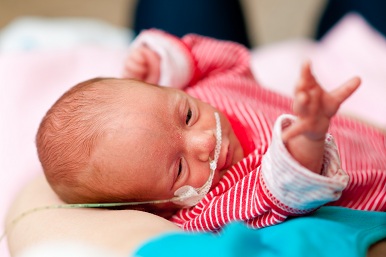New treatments for babies born with low blood pressure

Related topics
Health Innovation Health, Demographic Change and Wellbeing Belgium Czechia France Germany Ireland United Kingdom Canadadate: 24/02/2014
Project: Management of Hypotension In the Preterm...
acronym: THE HIP TRIAL
See also: CORDIS
Contact: Contact
Every year, around 25,000 babies born in Europe - just over one percent - suffer from hypotension or low blood pressure, yet the medical community is split on the best diagnosis and treatment for the condition. However, a major European Union (EU)-funded project, called The HIP Trial, is studying pre-term infants and shedding light onto the best treatment for hypotension in the first 72 hours of life . The research is expected to not only help save babies, but also better treat the long-term brain injuries that often accompany hypotension.
The project team is testing up to 830 infants with a 23–28 week gestational age. It is a multicentre, multinational, randomised trial bringing together experts in the medical care of newborns, clinical trials, neurophysiologists and pharmacologists. The trial includes comprehensive education and training through workshops and seminars.
According to the project coordinator, Gene Dempsey, from Cork University Maternity Hospital, Ireland, some of the issues surrounding hypotension have been unclear for decades. “This is a very important study,” he says. “We have been treating babies with low blood pressure for the past 30 years with no real understanding. We want to have a more objective approach that really tests the efficacy of the current treatments,” he adds.
The researchers are particularly keen on understanding the effects of the most commonly used treatment for hypotension, dopamine. Dopamine is best known as a chemical that transmits messages between nerve cells, and it is also used to treat low blood pressure. However, Dempsey says “there is little evidence that it actually improves the outcome for vulnerable infants.”
“The question about dopamine is whether it really deals with low blood flow, which is not the same as low blood pressure,” he explains. “Many babies treated for low blood pressure may have normal systemic blood flow and adequate oxygen delivery to their tissues, so they may not require treatment. We need to know what is really happening so we can limit treatments to those that really need it,” he says.
Hypotension is potentially fatal for pre-term infants, and even survivors can face lifelong injuries. An early lack of blood flow to the brain can lead to physical and cognitive disability. In the words of Dempsey, a more cautious approach to managing hypotension could save more lives, and that a more ‘permissive hypotension’, or careful observation of such infants without intervention, may be better. “We need to step back and ask if this is appropriate. Just because we increase the blood pressure does not mean we solve long term issues,” he adds.
The HIP Trial project has the potential to significantly improve the health of future generations of Europeans and have a positive impact on healthcare spending. “We want to make sure that the most vulnerable newborn infants receive the appropriate treatment and to ensure that these treatments come to the market and their use is widely made available,” concludes Dempsey.
28th February 2014 - Rare Diseases Day
